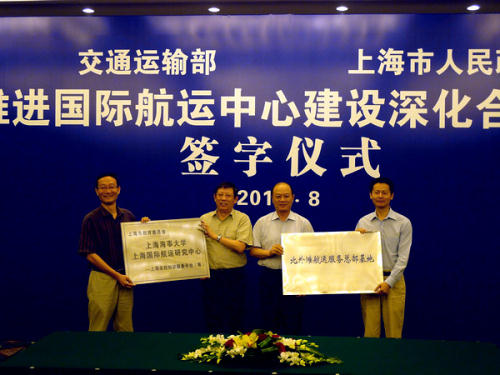|
The Shanghai International Shipping Institute (SISI) is a government think tank and industrial advisory institute that serves the national strategy of building the Shanghai international shipping center, and also an important support for fostering national key disciplines in Shanghai Maritime University.
Launching the project of Shanghai college knowledge service platform in March 2012, SISI is one of the first “college knowledge service platforms” established by Shanghai Education Commission in accordance with the Implementing Plan for Improving the Knowledge Service Capability of Shanghai Colleges (Hu Jiao Wei Ke [2011] No. 61, serial number ZF1209).
On August 10, 2012, at the signing ceremony of the memorandum of deepening the cooperation in accelerating the development of international shipping center between the Ministry of Transport and Shanghai Municipal Government, Yang Xiong, Executive Deputy Mayor, conferred the copper plaque of “Shanghai Maritime University Shanghai College Knowledge Service Platform - Shanghai International Shipping Institute” to Huang Youfang, President of Shanghai Maritime University.
1. Goal
(1) Setting up the board of directors and expert advisory committee to promote the interactive development of college and social resources and proactively adapt to social demand;
(2) Conducting researches on major issues concerning shipping development, providing the government with decision consultation on China’s shipping development and the construction of Shanghai international shipping center, and becoming a world-renowned think tank and a supportive force for corporate development;
(3) Serving the international and domestic shipping industries, and producing influential results by providing market analysis report, data information service and research and consulting service;
(4) Continuously strengthening the interaction and integration of various disciplines, improving SISI’s capability of undertaking major national and local research tasks, and enhancing the university’s level of discipline development and capability of social service;
(5) Establishing a “flexible” flow of high-caliber talents guided by the system, in the basic form of work contract, and not subject to the limitation of geography or national boundary.
2. Achievements
(1) Primarily setting up special policy zones in the university, innovating the system and institution, adapting to and integrating industrial demand in depth, building multiple forms of coordinated innovation, and truly realizing college-local, college-college, college-institute and college-enterprise strategic coordination;
(2) Primarily becoming an important and strategic government think tank serving China’s shipping development and the construction of Shanghai international shipping center;
(3) Primarily establishing a shipping consulting institute reputed in China and influential in the world;
(4) Primarily establishing a research mechanism featured by open cooperation and becoming a key platform and test field for discipline interaction and optimization in the university;
(5) Primarily exploring and establishing the flexible talent flow mechanism and the student innovation and cultivation mechanism. The flowing talents have become a key force to realize the goals of the platform and the students cultivated here are welcomed by the industry.

|